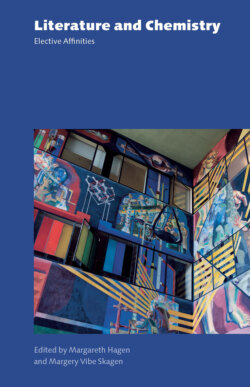Читать книгу Literature and Chemistry - Группа авторов - Страница 6
На сайте Литреса книга снята с продажи.
LITERATURE AND CHEMISTRY: THE STATE OF THE FIELD
ОглавлениеIn recent encyclopedias and manuals on literature and science, chemistry is not accorded much space. Pamela Gossin’s Encyclopedia of Literature and Science portrays chemistry as a science of marvellous and uncanny transformations, thus charged with metaphorical potential. Goethe’s Faust and Elective Affinities are remembered, and so is the romantic perception of chemistry: the active, organic Nature of Humphry Davy, and his friends Coleridge and Wordsworth.
Stephen J. Weininger, author of the article on chemistry in the aforementioned Encyclopedia, comments on the fact that even though chemistry became increasingly indispensable to daily life in the industrialised world, its concepts and practitioners have not inspired much imaginative literature. He eventually points to the novels of Thomas Pynchon as one of the most prominent exceptions, before remembering the contributions of the chemist Carl Djerassi and the Nobel Prize laureate Roald Hoffman, and finally, the literary work of Primo Levi.
In The Routledge Companion to Literature and Science (2011) Jay Labinger’s chapter distinguishes between the historic development of chemistry in literature in the nineteenth and the twentieth centuries, since the status of chemistry within science changed around 1900, affecting the relationship between science and literature. In the earlier century, chemistry is included in literary portrayals of contemporary and experimental science, while in the twentieth century chemistry has been less visible, mainly due to its falling between the disciplines of biology and physics. Among the authors mentioned by Labinger are Davy, Coleridge, Wordsworth, Goethe, Balzac, Dickens, Zola, Christie, Hoffmann, Laszlo, Djerassi, DeLillo, and Levi. Labinger’s article points to the role of chemistry in detective and science fiction.8 But chemistry does not play a dominant role in science fiction either; physics and biology, and more recently neurology, typically occupy centre stage in this genre.
The volume Chemistry and Science Fiction, edited by Jack H. Stocker, highlights the contributions of Isaac Asimov (who held a Ph.D. in chemistry), H. C. Wells, and Thomas Pynchon, among others, but again makes it clear that chemistry is not the scientific discipline preferred by science fiction authors.
Chemistry’s fairly minor role in last century’s fiction should not lead us to conclude that this discipline has been neglected in literature. The fact is rather, as Labinger also states, that it has always been there, since the first Greek authors speculated about a world constructed of elements and atoms. Following chemistry’s role in literature is thus a journey through the history of ideas, in natural philosophy and in the historical development of the symbolism and nomenclature of the elements.
